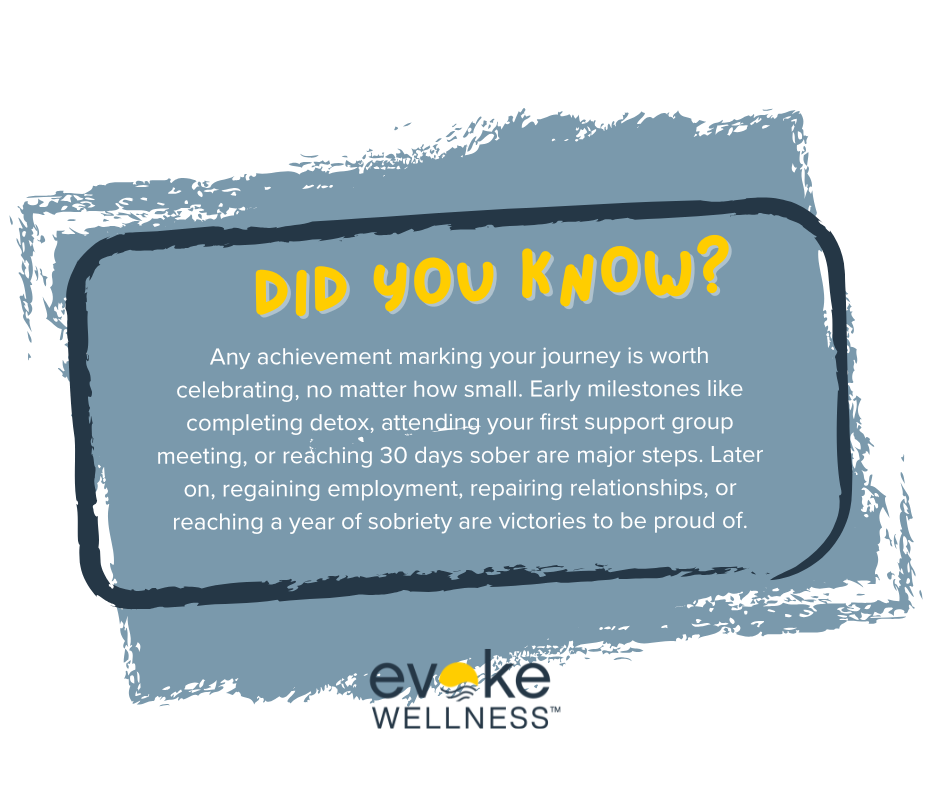As you embark on your journey to recovery, recognizing and celebrating milestones becomes a crucial component of your success. Recent studies show that acknowledging progress in addiction treatment can significantly improve long-term outcomes. In fact, a 2022 survey by the National Institute on Drug Abuse found that individuals who regularly celebrated recovery milestones were 30% more likely to maintain sobriety after one year. This article will explore the importance of marking achievements in addiction recovery, mental health recovery, and dual diagnosis treatment. You’ll discover how partial hospitalization programs (PHP) can provide the structure and support needed to recognize and build upon your progress towards a healthier, substance-free life.
Together, let’s embrace the journey to recovery and the promise of a new beginning. Call us at (866)429-2960 today or reach out online.
The Importance of Celebrating Milestones in Addiction Recovery
Reinforcing Progress and Motivation
Celebrating milestones in addiction recovery is crucial as it helps reinforce progress and motivate continued efforts. Reaching sobriety goals, such as 30 days, 6 months, or 1 year, are significant achievements that should be recognized and celebrated. As highlighted by Evoke Wellness, these celebrations can boost self-esteem, increase feelings of accomplishment, and provide encouragement to maintain recovery.
Building Community and Support
Marking progress through celebrations creates a sense of community and support, which is crucial for those in recovery. Evoke Wellness emphasizes that celebrating milestones helps individuals stay focused on their goals and maintain a positive outlook on their journey. This community support acts as a protective factor against relapse and reinforces the individual’s commitment to sobriety.
Reflecting on Progress and Gratitude
Additionally, celebrating milestones provides an opportunity for reflection and gratitude. These celebrations allow individuals to acknowledge their personal growth, such as mending relationships, achieving personal goals, or attending events without substance use. This reflection fosters a sense of pride and reinforces the positive changes that have occurred during the recovery process.
The Power of Positive Reinforcement in Addiction Recovery
Fostering Motivation
Positive reinforcement plays a pivotal role in sustaining long-term sobriety by fostering intrinsic motivation. This approach triggers the release of dopamine in the brain’s reward pathway, strengthening neural connections associated with desired behaviors. By consistently providing rewards or incentives for achievements like attending counseling sessions or abstaining from substance use, individuals develop a positive feedback loop that encourages them to maintain their progress.
A Supportive Environment
The incorporation of positive reinforcement in addiction treatment settings creates a supportive and motivating environment that enhances the overall effectiveness of the recovery process. This technique is more effective than negative reinforcement or punishment in promoting desired behaviors and reducing unwanted ones. It fosters a sense of accomplishment, boosts self-esteem, and empowers individuals to develop healthier coping mechanisms and alternative strategies for dealing with stress and cravings.
Celebrating Progress
Positive reinforcement enables individuals to celebrate and recognize their progress, thereby instilling a sense of control over their recovery journey. Implementing this approach shifts the focus from what individuals are missing out on by avoiding substances to what they are gaining by staying sober, making the recovery process more tangible and the progress more clear. This approach not only strengthens sobriety but also helps rebuild strained relationships and develop a stronger sense of self-control.
Overcoming Challenges and Setbacks in Addiction Recovery
A Persistent Mindset
Addiction recovery is a journey filled with ups and downs. Setbacks and relapses are common, even for those who have achieved significant progress. A key strategy is cultivating a persistent mindset, recognizing that challenges are temporary obstacles, not permanent roadblocks. With the right support system and coping mechanisms, you can overcome these hurdles and regain your footing on the path to lasting recovery.
Building Resilience
To build resilience, it’s essential to develop a “toolbox” of healthy coping strategies. These may include mindfulness practices, exercise routines, creative outlets, or seeking support from loved ones. Experiment with different techniques to find what works best for you, and don’t hesitate to seek professional guidance in developing a personalized coping plan.
Embracing a Holistic Approach
Overcoming addiction requires a holistic approach that addresses the physical, mental, and emotional aspects of the recovery process. Comprehensive treatment programs offer a range of therapies, such as individual counseling, group sessions, and holistic therapies, to help you develop the skills and resilience needed to navigate challenges and setbacks.
Leaning on Support
A strong support network is invaluable when facing challenges in recovery. Surrounding yourself with understanding individuals, whether through counseling, support groups, or sober living communities, can provide the encouragement, accountability, and shared experiences necessary to overcome obstacles and maintain motivation.
Practicing Self-Compassion
Remember, setbacks are a normal part of the recovery process, not a failure. Practice self-compassion and avoid self-judgment when faced with challenges. Instead, focus on learning from the experience, adjusting your approach, and continuing to move forward with the support of your recovery community.
Through a combination of professional treatment, a strong support system, and a resilient mindset, you can develop the tools and strategies necessary to overcome the challenges and setbacks that may arise in your addiction recovery journey.
The Link Between Mental Health and Addiction Recovery
Addressing Co-Occurring Disorders
Substance abuse and mental illness often go hand-in-hand, with over 50% of those with a severe mental disorder also experiencing substance use disorder. This dual diagnosis presents unique challenges that require an integrated, holistic approach to treatment. Addressing underlying mental health issues like depression, anxiety, or trauma is crucial for lasting addiction recovery.
Importance of Dual Diagnosis Treatment
Attempting to treat just the addiction without properly managing co-occurring psychiatric conditions increases the risk of relapse. Dual diagnosis programs combine evidence-based therapies for substance abuse with psychotherapy and medication management for mental health disorders. This comprehensive care tackles the root causes fueling the addiction-mental illness cycle.
Partial Hospitalization for Intensive Support
For those needing a high level of intensive outpatient care, Partial Hospitalization Programs (PHPs) can bridge the gap between residential treatment and lower levels of outpatient therapy. PHPs provide structured daily programming with individual and group counseling, life skills training, holistic therapies, and peer support – all while allowing participants to return home each evening.
Long-Term, Integrated Care
Recovery is an ongoing journey, requiring continued support and coping strategies. Aftercare programs reinforce the skills learned in treatment while providing community connections to maintain motivation. Prioritizing mental health through counseling, medication management, and lifestyle changes is vital for preventing relapse and sustaining sobriety long-term.
The Benefits of Partial Hospitalization Programs (PHPs) in Addiction Recovery
Partial hospitalization programs (PHPs) offer a crucial step-down level of care for those recovering from substance abuse disorders. As an intensive outpatient treatment option, PHPs provide structured daily programming while allowing participants to return home each evening.
A Bridge to Independence
PHPs serve as a vital transition between inpatient treatment and fully independent living. They facilitate the gradual reintegration into daily routines and responsibilities, helping individuals practice applying recovery skills in real-world settings while still receiving comprehensive care and support.
Comprehensive Addiction Treatment
Through individual and group therapy sessions, educational workshops, and other recovery-focused activities, PHPs equip participants with essential coping mechanisms for managing cravings, triggers, and difficult emotions. They also address underlying issues contributing to addiction and focus on rebuilding relationships impacted by substance abuse.
Cost-Effective, Structured Care
Compared to residential treatment, PHPs offer high-quality care at a lower cost, making them a more affordable option for those requiring a highly structured treatment setting during recovery. They provide a higher level of support than traditional outpatient programs, with intensive daily programming tailored to individual needs.
Building a Strong Support Network
PHPs foster a sense of community and shared experience among participants, allowing them to build a strong support network. Through group sessions and shared activities, individuals can learn from each other’s journeys, develop healthy relationships, and cultivate accountability partnerships that can aid in long-term sobriety.
Partial hospitalization programs offer a comprehensive approach to addiction recovery, bridging the gap between inpatient treatment and independent living. With their intensive yet flexible structure, focus on skill-building, and emphasis on community support, PHPs can be a crucial step toward lasting sobriety and improved overall well-being.
The Power of Acknowledging Progress in Addiction Recovery: FAQs
Acknowledging milestones in addiction recovery is a powerful motivator that reinforces positive behaviors. Recovery is a profound transformation requiring developing healthy coping skills, rebuilding relationships, and fostering self-acceptance. Here are some common questions about celebrating progress:
What Counts as a Milestone?
Why is Recognizing Progress Important?
Addiction changes the brain’s reward system, making it harder to experience pleasure from normal activities. Celebrating milestones provides a much-needed dopamine boost that reinforces your hard work and commitment to recovery. It also builds self-efficacy – the belief that you can achieve your goals.
How Can I Celebrate?
Mark the occasion in a way that’s meaningful to you. Treat yourself to a special meal, plan an outing with sober friends, or share your accomplishment at a support group meeting. Visual reminders like logs, coins, or journals can motivate you during tough times. Most importantly, take time for self-reflection on how far you’ve come.
Acknowledging progress is an integral part of the recovery journey. By pausing to celebrate each milestone, you reinforce the positive changes you’ve made and reaffirm your commitment to lifelong healing.
Conclusion
As you continue on your journey of addiction recovery, remember that every step forward is a victory worth celebrating. By acknowledging your progress, no matter how small, you reinforce positive behaviors and boost your motivation to persist. Recent studies show that individuals who regularly celebrate milestones are 30% more likely to maintain long-term sobriety. Whether you’re in a PHP program, dual diagnosis treatment, or focusing on mental health recovery alongside addiction, take time to recognize your achievements. Surround yourself with supportive individuals who will cheer on your progress. With each milestone you reach, you’re not just overcoming addiction – you’re reclaiming your life and building a brighter future.
Begin Your Journey with Evoke Wellness
If you or a loved one is considering treatment, Evoke Wellness invites you to contact us. Our compassionate team is ready to answer your questions, discuss your needs, and help you take the first steps toward recovery. At Evoke Wellness, you will find more than just a treatment program – you’ll discover a community dedicated to your wellness and success. Together, let’s embrace the journey to recovery and the promise of a new beginning. Call us at (866)429-2960 today or reach out online.



